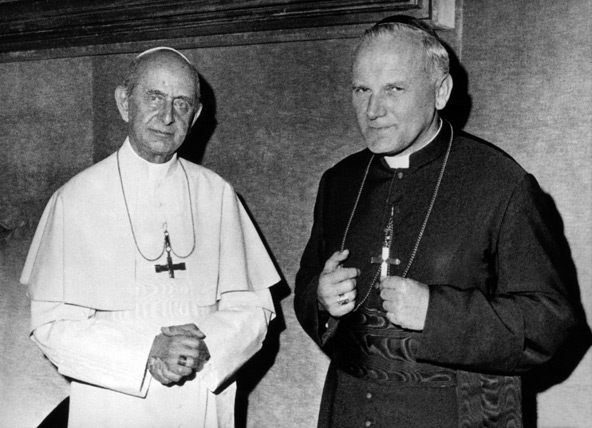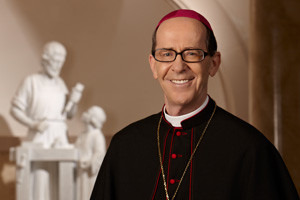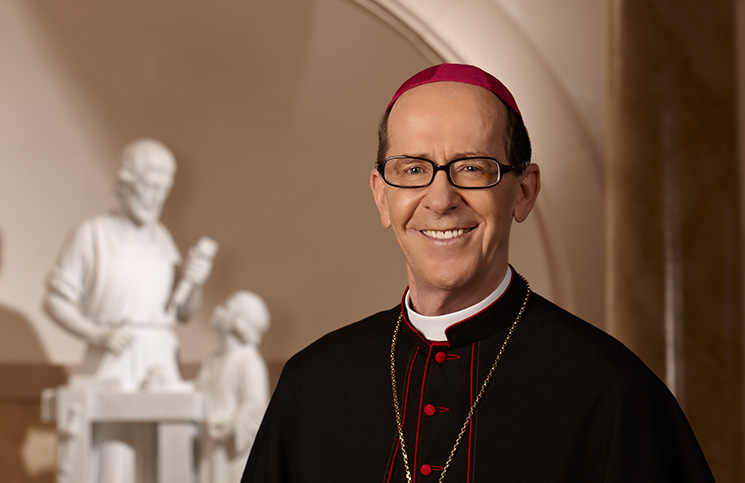
Pope John Paul II’s “Theology of the Body” is a fresh re-presenting of the Church’s teaching on the gift of human sexuality and the mission of married couples. It lays out more clearly and persuasively what Paul VI taught in Humanae Vitae, while rooting the presentation in a richer biblical context.

Marriage, said John Paul II, is a visible image of the love of the divine persons of the Blessed Trinity, the dynamic love between the Father, the Son and the Holy Spirit. It is also a sign of Christ’s love for the Church, His spouse. It mirrors the love of Christ on the Cross (I John 3:16), “The way we came to understand love was that He laid down His life for us.” Certainly, every marriage here on earth is between two imperfect persons who stand in constant need of God’s mercy, but it is in their marital embrace, in their fidelity and in the care of their children that the reality of God’s love is revealed.
Two meanings inseparably joined
Through the marriage bond, God creates a communion of persons within which new life is brought forth as the fruit of conjugal love. This is God’s plan from the beginning. In other words, the two primary meanings of the marital embrace are joined together: the unitive meaning and the procreative meaning. The procreative meaning is that which is fulfilled in the blessing of children and the unitive meaning is that which comes from communion in love.
These two meanings (or ends) of marriage (the life-giving and the love-giving) are so bound together that the marriage itself is gravely harmed, should they ever be divided. More importantly, when both ends are embraced and lived to the full, abundant good comes to the family and to the larger society. Abundant good is always the fruit of obedience to God’s plan for our lives.
Totally yours
On the other hand, married love is not true to itself unless it remains open to new life. It must be both unitive and procreative, not either/or but both/and. Why? Because authentic love gives all. We hear this language of totality in the greatest of the commandments when Jesus says: “You shall love the Lord your God with all your heart, with all your soul and with all your mind.” To love as Jesus loves is to give everything we are and have, no matter the cost.
In Humanae Vitae, Paul VI writes that conjugal love “is total; that is, it is a very special form of personal friendship whereby the spouses generously share everything with each other without undue reservations and without concern for their selfish convenience. One who truly loves his spouse not only loves her for what he receives from her but also for her own sake. This he does joyfully, as he enriches his beloved with the gift of himself.”
To love totally in marriage means not withholding the fertile part of being a man or woman; that is, the wife gives all of her femininity and the husband gives all of his masculinity. Should one or both resort to contraception, they would be withdrawing their fertility from the giving. They would not be giving their all. Such action not only makes procreation impossible (preventing cooperation with God in life-giving love) but also damages the bonds of love (harming the love-giving end). It is no surprise that many marriages are weak because of the use of contraception. Every time that a married couple uses contraception they withhold love from one another. The marital embrace then becomes solely focused on pleasure and is not the self-giving, unifying, and potentially fruitful act that God created it to be.
The Blessing of NFP
Does that mean that married couples must have as many children as possible? Not at all. In fact, by God’s design the marital embrace cannot always be fertile. The woman’s cycle goes through times of both fertility and infertility. In light of this God-given fact, spouses can plan their families by taking into account the fertile or non-fertile times. We call this Natural Family Planning.
When Paul VI issued Humanae Vitae, teaching that contraception is seriously sinful, he called for new research to provide couples with improved methods of family planning that were natural, ethical, and healthy. Since then, great advances have been made in understanding natural fertility and developing scientifically validated methods of fertility regulation (commonly known as NFP). Today, these natural methods are as reliable as contraceptives. Simply put, if a woman is not fertile, she cannot become pregnant. More importantly, they are morally good and have no harmful side effects on the woman’s health. The use of contraceptives, of course, is always morally evil and many of them have harmful side effects as well.
The personal benefits of NFP make it especially attractive. Natural methods strengthen the harmony and mutual understanding of husband and wife. They lead to a deeper awareness of the blessing of children. They foster respect for nature and for the personal dignity of all persons.
These natural methods are not well known, however. And prejudices about them still abound. Incidentally, NFP is not what many refer to as the rhythm method. There is solid science behind NFP. What makes this not knowing particularly tragic is that ignorance of these natural methods and a widespread contraceptive mentality have led to acts that are directly contrary to marriage and to life itself — acts such as abortion, sterilization, and test-tube fertilization.
Nonetheless, as St. Paul writes, there is no chaining of the word of God. The good news about NFP and the Theology of the Body, and the prophetic wisdom of Humanae Vitae, shine forth more convincingly each day. Can we not see the Holy Spirit at work in our midst, lifting up the Gospel of Life?
This is an excerpt from a column originally published in the July 21, 2005 issue of The Catholic Sun.






![[VIDEO] Make Sunday feel like Sunday again](https://www.catholicsun.org/wp-content/uploads/2021/04/2021-YOUTUBE-BISHOP-MESSAGE-THUMBNAIL-ENGLISH-218x150.png)
